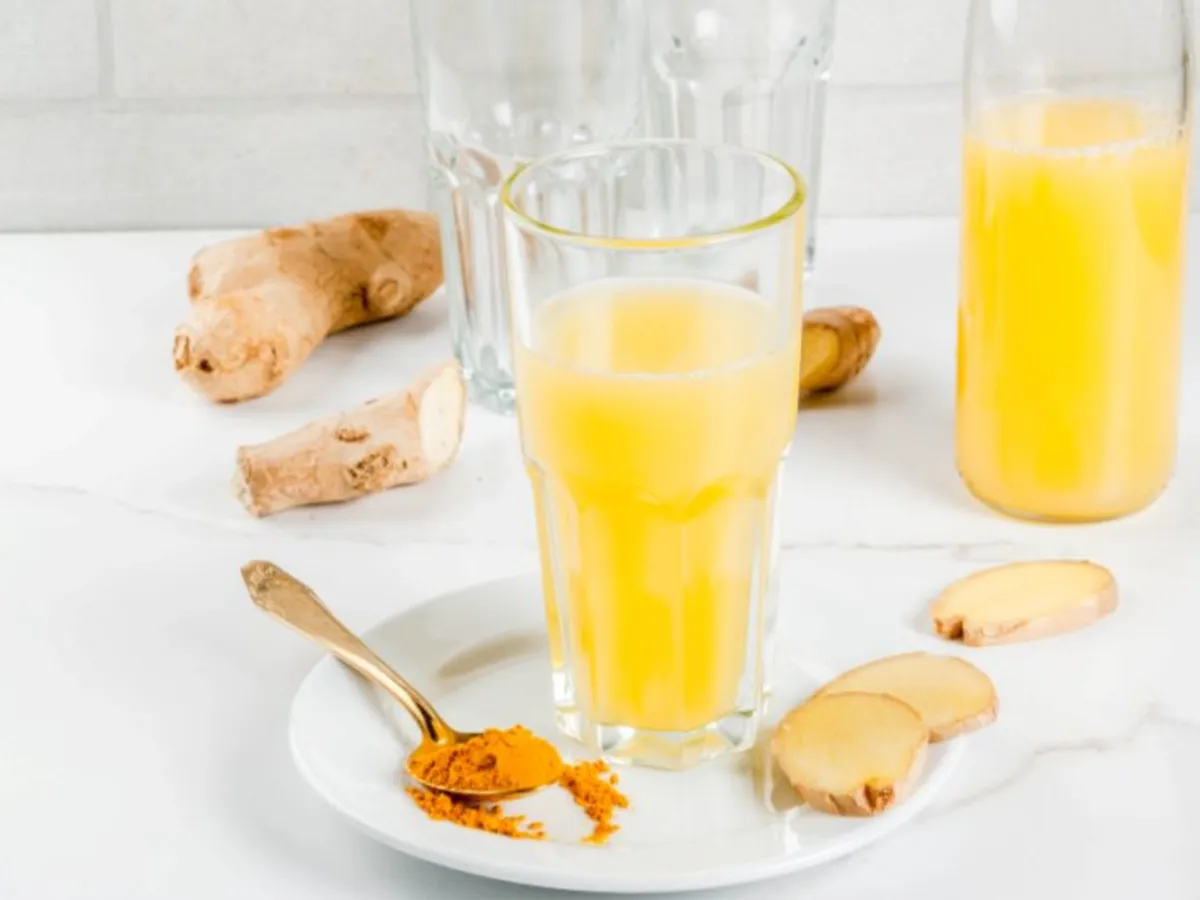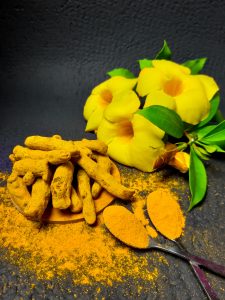Food Drink
Turmeric and Curcumin for Cognitive Enhancement and Mood Regulation

The pursuit of optimal brain health and emotional well-being is a timeless endeavor. In this quest, nature has provided us with a potent ally: turmeric. This vibrant spice, celebrated for its culinary uses, boasts an array of potential cognitive and mood benefits, primarily attributed to its active compound, curcumin. In this exploration, we will delve into the fascinating world of turmeric and curcumin, and how they may positively impact brain health and mood regulation.
Understanding Cognitive Health
Cognitive health encompasses a wide range of mental processes, from memory and learning to problem-solving and decision-making. It is influenced by various factors, including genetics, lifestyle, and the environment. As we age, preserving cognitive function becomes increasingly vital. This is where turmeric and curcumin come into play.
The Science Behind Curcumin
At the heart of turmeric’s potential for cognitive and mood benefits lies curcumin, a powerful polyphenol with anti-inflammatory and antioxidant properties. It is curcumin that gives turmeric its bright yellow color and provides many of its therapeutic effects.
Enhancing Cognitive Function
1. Neuroprotection
Curcumin’s antioxidant properties help protect brain cells from oxidative damage caused by free radicals. This protective effect may contribute to the preservation of cognitive function and a reduced risk of neurodegenerative diseases.

Image by: https://www.timesnownews.com/health/article/warm-turmeric-water-for-weight-loss-five-amazing-health-benefits-of-drinking-this-magic-mix-every-morning/99573
2. Improved Memory
Research suggests that curcumin can enhance memory and cognitive function. It may promote the growth of new brain cells and increase brain-derived neurotrophic factor (BDNF), a growth hormone that functions in the brain, potentially leading to improved memory and learning.
3. Mood Regulation
Turmeric and curcumin also show promise in supporting emotional well-being. They can positively influence mood and may offer an alternative or complementary approach to mood disorders.
Mood Regulation
1. Antidepressant Properties
Some studies indicate that curcumin may have antidepressant effects by increasing the levels of serotonin and dopamine in the brain. These neurotransmitters play a crucial role in regulating mood.
2. Stress Reduction
Curcumin’s anti-inflammatory properties may help alleviate the effects of chronic stress, which can contribute to mood disorders. By reducing inflammation, curcumin may promote emotional stability.
Exploring the Cognitive and Mood Benefits
Let’s take a closer look at the potential cognitive and mood benefits that turmeric and curcumin may offer:
1. Cognitive Enhancement
Turmeric and curcumin may promote cognitive enhancement, including better memory, faster learning, and improved problem-solving skills. This is particularly valuable for individuals seeking to maintain cognitive function as they age.
2. Mood Stability
Curcumin’s potential to regulate mood is a valuable aspect of its benefits. Whether it’s addressing depressive symptoms or reducing the impact of chronic stress, turmeric and curcumin offer a natural approach to mood regulation.
3. Neurological Protection
Preserving brain health is crucial, and curcumin’s neuroprotective effects may reduce the risk of neurodegenerative diseases such as Alzheimer’s and Parkinson’s disease.
4. Combating Cognitive Decline
For those concerned about cognitive decline, curcumin’s potential to stimulate the growth of new brain cells and protect against oxidative stress offers hope for maintaining cognitive function.
Incorporating Turmeric into Your Lifestyle
To unlock the cognitive and mood benefits of turmeric and curcumin, consider these approaches:
1. Turmeric Supplements
High-quality turmeric supplements with standardized curcumin content offer a convenient and reliable way to incorporate these compounds into your routine.
2. Culinary Delights
Adding turmeric to your culinary creations, from curries and soups to roasted vegetables, can be a flavorful and health-enhancing choice.
3. Turmeric Tea
Enjoy the soothing and aromatic qualities of turmeric by brewing your own turmeric tea. Simply steep grated fresh turmeric or turmeric powder in hot water.

Photo by Tamanna Rumee on Unsplash
4. Topical Applications
For mood regulation and potential stress relief, you can explore the use of turmeric in DIY skincare products, such as face masks or creams.
Conclusion
Turmeric and its active compound, curcumin, hold the potential to positively impact cognitive health and mood regulation. Their anti-inflammatory and antioxidant properties, combined with their effects on neurotransmitters and brain cell growth, make them valuable additions to a holistic approach to overall well-being. As with any health-related changes, it is advisable to consult with a healthcare professional to ensure that incorporating turmeric and curcumin aligns with your individual needs. By embracing the cognitive and mood benefits of this golden spice, you can work towards a sharper mind and a brighter emotional outlook.
Food Drink
Top Cooking Products for Home Chefs in 2024

Top Cooking Products for Home Chefs in 2024
Cooking at home has become a delightful and creative activity for many, thanks to the rise of innovative kitchen gadgets. These tools are designed to simplify cooking processes, enhance food quality, and bring a professional touch to home-cooked meals. In this article, we will explore some of the most exciting kitchen gadgets currently available, analyze their features, and compare their benefits and drawbacks.

Freepik.com
The Rise of Smart Kitchen Gadgets
The Smart Oven
Smart ovens have revolutionized the way we cook. Equipped with Wi-Fi connectivity and intelligent sensors, these ovens can be controlled remotely via smartphone apps. Features like automated cooking settings, recipe guidance, and precise temperature control make smart ovens an essential gadget for modern kitchens.
Key Features:
- Remote control via smartphone
- Recipe and cooking presets
- Self-cleaning functions
- Energy-efficient design
Smart Refrigerators
Smart refrigerators are another leap forward in kitchen technology. These appliances come with touchscreens, internet connectivity, and internal cameras. They can manage grocery lists, suggest recipes based on available ingredients, and even alert you when food items are nearing their expiration dates.
Key Features:
- Touchscreen interface
- Inventory management
- Recipe suggestions
- Expiration date alerts
Gadgets for Precision Cooking
Sous Vide Precision Cooker
Sous vide cooking has gained popularity among home chefs for its ability to deliver restaurant-quality results. A sous vide precision cooker allows you to cook food in a water bath at a precisely controlled temperature, ensuring even cooking and enhanced flavors.
Key Features:
- Precise temperature control
- Consistent cooking results
- Retains food moisture and nutrients
- Easy to use
Digital Meat Thermometer
A digital meat thermometer is essential for achieving perfect doneness in meats. These thermometers provide instant and accurate readings, helping you avoid overcooking or undercooking your food.
Key Features:
- Instant temperature readings
- High accuracy
- Easy to read display
- Preset temperatures for different meats
Time-Saving Gadgets
Instant Pot
The Instant Pot is a multifunctional pressure cooker that combines several kitchen appliances into one. It can pressure cook, slow cook, sauté, steam, and even make yogurt. This versatility makes it a favorite among busy home chefs looking to save time and space in the kitchen.
Key Features:
- Multiple cooking functions
- Fast cooking times
- User-friendly interface
- Energy-efficient
Food Processor
A food processor is a versatile kitchen tool that can chop, slice, shred, and puree ingredients quickly. It’s perfect for preparing vegetables, making dough, and creating sauces and dips, significantly reducing prep time.
Key Features:
- Multiple blade attachments
- Large capacity bowl
- Easy to clean
- Time-saving
Gadgets for Healthy Cooking
Air Fryer
Air fryers have become popular for their ability to fry foods with little to no oil, offering a healthier alternative to traditional frying. They use hot air circulation to cook food evenly and create a crispy texture.
Key Features:
- Requires little to no oil
- Rapid cooking times
- Versatile cooking options
- Easy to clean
Spiralizer
A spiralizer is a fantastic tool for creating vegetable noodles, which are a great low-carb alternative to traditional pasta. It’s perfect for those looking to incorporate more vegetables into their diet creatively.
Key Features:
- Creates vegetable noodles
- Easy to use
- Multiple blade options
- Compact design
Specialty Gadgets
Bread Maker
For those who love fresh bread, a bread maker is a game-changer. This gadget mixes, kneads, and bakes bread with minimal effort, allowing you to enjoy homemade bread with ease.
Key Features:
- Automatic mixing, kneading, and baking
- Customizable settings
- Timer functions
- Easy to clean
Ice Cream Maker
An ice cream maker lets you create your own frozen treats at home. You can experiment with flavors, control the ingredients, and enjoy freshly made ice cream, sorbet, or frozen yogurt whenever you want.
Key Features:
- Customizable flavors
- Control over ingredients
- Easy to use
- Quick freezing times
Comparative Analysis
To provide a clearer understanding of these innovative kitchen gadgets, let’s analyze and compare their features, benefits, and potential drawbacks.
| Gadget | Key Features | Benefits | Drawbacks |
| Smart Oven | Remote control, recipe presets, self-cleaning, energy-efficient | Convenience, precision cooking, saves time | High cost, requires Wi-Fi connectivity |
| Smart Refrigerator | Touchscreen, inventory management, recipe suggestions, expiration alerts | Reduces food waste, simplifies meal planning | Expensive, complex setup |
| Sous Vide Precision Cooker | Precise temperature control, consistent results, retains moisture | Restaurant-quality food, easy to use | Requires additional equipment (vacuum sealer) |
| Digital Meat Thermometer | Instant readings, high accuracy, preset temperatures | Perfectly cooked meats, easy to use | Limited to meat cooking |
| Instant Pot | Multiple functions, fast cooking, user-friendly | Saves time and space, versatile | Learning curve for multiple functions |
| Food Processor | Multiple blade attachments, large capacity, time-saving | Speeds up prep work, versatile | Can be bulky and noisy |
| Air Fryer | Little to no oil, rapid cooking, versatile | Healthier fried foods, easy to clean | Limited capacity, requires counter space |
| Spiralizer | Creates vegetable noodles, multiple blade options | Promotes healthy eating, easy to use | Manual operation, limited use |
| Bread Maker | Automatic mixing, kneading, baking, customizable settings | Fresh homemade bread, easy to use | Bulky, single-purpose |
| Ice Cream Maker | Customizable flavors, control over ingredients, quick freezing | Fresh homemade ice cream, easy to use | Requires pre-freezing bowl (for some models) |
Conclusion
Innovative kitchen gadgets have transformed home cooking by making it easier, faster, and more enjoyable. From smart ovens and refrigerators to sous vide cookers and air fryers, these tools offer a wide range of benefits that cater to different cooking styles and preferences. By investing in these gadgets, home chefs can elevate their culinary skills, save time, and enjoy healthier, tastier meals. Whether you are a novice cook or a seasoned chef, there is a kitchen gadget out there that can enhance your cooking experience and bring new creativity to your home kitchen.
Food Drink
The Best Cooking Products for Home Chefs in 2024

The Best Cooking Products for Home Chefs in 2024
Cooking at home has become a delightful and creative activity for many, thanks to the rise of innovative kitchen gadgets. These tools are designed to simplify cooking processes, enhance food quality, and bring a professional touch to home-cooked meals. In this article, we will explore some of the most exciting kitchen gadgets currently available, analyze their features, and compare their benefits and drawbacks.

Freepik.com
The Rise of Smart Kitchen Gadgets
The Smart Oven
Smart ovens have revolutionized the way we cook. Equipped with Wi-Fi connectivity and intelligent sensors, these ovens can be controlled remotely via smartphone apps. Features like automated cooking settings, recipe guidance, and precise temperature control make smart ovens an essential gadget for modern kitchens.
Key Features:
- Remote control via smartphone
- Recipe and cooking presets
- Self-cleaning functions
- Energy-efficient design
Smart Refrigerators
Smart refrigerators are another leap forward in kitchen technology. These appliances come with touchscreens, internet connectivity, and internal cameras. They can manage grocery lists, suggest recipes based on available ingredients, and even alert you when food items are nearing their expiration dates.
Key Features:
- Touchscreen interface
- Inventory management
- Recipe suggestions
- Expiration date alerts
Gadgets for Precision Cooking
Sous Vide Precision Cooker
Sous vide cooking has gained popularity among home chefs for its ability to deliver restaurant-quality results. A sous vide precision cooker allows you to cook food in a water bath at a precisely controlled temperature, ensuring even cooking and enhanced flavors.
Key Features:
- Precise temperature control
- Consistent cooking results
- Retains food moisture and nutrients
- Easy to use
Digital Meat Thermometer
A digital meat thermometer is essential for achieving perfect doneness in meats. These thermometers provide instant and accurate readings, helping you avoid overcooking or undercooking your food.
Key Features:
- Instant temperature readings
- High accuracy
- Easy to read display
- Preset temperatures for different meats
Time-Saving Gadgets
Instant Pot
The Instant Pot is a multifunctional pressure cooker that combines several kitchen appliances into one. It can pressure cook, slow cook, sauté, steam, and even make yogurt. This versatility makes it a favorite among busy home chefs looking to save time and space in the kitchen.
Key Features:
- Multiple cooking functions
- Fast cooking times
- User-friendly interface
- Energy-efficient
Food Processor
A food processor is a versatile kitchen tool that can chop, slice, shred, and puree ingredients quickly. It’s perfect for preparing vegetables, making dough, and creating sauces and dips, significantly reducing prep time.
Key Features:
- Multiple blade attachments
- Large capacity bowl
- Easy to clean
- Time-saving
Gadgets for Healthy Cooking
Air Fryer
Air fryers have become popular for their ability to fry foods with little to no oil, offering a healthier alternative to traditional frying. They use hot air circulation to cook food evenly and create a crispy texture.
Key Features:
- Requires little to no oil
- Rapid cooking times
- Versatile cooking options
- Easy to clean
Spiralizer
A spiralizer is a fantastic tool for creating vegetable noodles, which are a great low-carb alternative to traditional pasta. It’s perfect for those looking to incorporate more vegetables into their diet creatively.
Key Features:
- Creates vegetable noodles
- Easy to use
- Multiple blade options
- Compact design
Specialty Gadgets
Bread Maker
For those who love fresh bread, a bread maker is a game-changer. This gadget mixes, kneads, and bakes bread with minimal effort, allowing you to enjoy homemade bread with ease.
Key Features:
- Automatic mixing, kneading, and baking
- Customizable settings
- Timer functions
- Easy to clean
Ice Cream Maker
An ice cream maker lets you create your own frozen treats at home. You can experiment with flavors, control the ingredients, and enjoy freshly made ice cream, sorbet, or frozen yogurt whenever you want.
Key Features:
- Customizable flavors
- Control over ingredients
- Easy to use
- Quick freezing times
Comparative Analysis
To provide a clearer understanding of these innovative kitchen gadgets, let’s analyze and compare their features, benefits, and potential drawbacks.
| Gadget | Key Features | Benefits | Drawbacks |
| Smart Oven | Remote control, recipe presets, self-cleaning, energy-efficient | Convenience, precision cooking, saves time | High cost, requires Wi-Fi connectivity |
| Smart Refrigerator | Touchscreen, inventory management, recipe suggestions, expiration alerts | Reduces food waste, simplifies meal planning | Expensive, complex setup |
| Sous Vide Precision Cooker | Precise temperature control, consistent results, retains moisture | Restaurant-quality food, easy to use | Requires additional equipment (vacuum sealer) |
| Digital Meat Thermometer | Instant readings, high accuracy, preset temperatures | Perfectly cooked meats, easy to use | Limited to meat cooking |
| Instant Pot | Multiple functions, fast cooking, user-friendly | Saves time and space, versatile | Learning curve for multiple functions |
| Food Processor | Multiple blade attachments, large capacity, time-saving | Speeds up prep work, versatile | Can be bulky and noisy |
| Air Fryer | Little to no oil, rapid cooking, versatile | Healthier fried foods, easy to clean | Limited capacity, requires counter space |
| Spiralizer | Creates vegetable noodles, multiple blade options | Promotes healthy eating, easy to use | Manual operation, limited use |
| Bread Maker | Automatic mixing, kneading, baking, customizable settings | Fresh homemade bread, easy to use | Bulky, single-purpose |
| Ice Cream Maker | Customizable flavors, control over ingredients, quick freezing | Fresh homemade ice cream, easy to use | Requires pre-freezing bowl (for some models) |
Conclusion
Innovative kitchen gadgets have transformed home cooking by making it easier, faster, and more enjoyable. From smart ovens and refrigerators to sous vide cookers and air fryers, these tools offer a wide range of benefits that cater to different cooking styles and preferences. By investing in these gadgets, home chefs can elevate their culinary skills, save time, and enjoy healthier, tastier meals. Whether you are a novice cook or a seasoned chef, there is a kitchen gadget out there that can enhance your cooking experience and bring new creativity to your home kitchen.
Food Drink
The Best Insulated Tumblers for Your Drinkware Collection
The Best Insulated Tumblers for Your Drinkware Collection
The global push towards sustainable living has sparked a revolution in various sectors, including drinkware. Among the various eco-friendly options, insulated tumblers have emerged as a popular choice. These versatile containers offer numerous benefits, from reducing plastic waste to maintaining beverage temperatures. This article delves into the rise of insulated tumblers, examining their environmental impact, popularity, and the technological advancements that make them a superior choice for consumers.

amazon.co.uk
The Environmental Impact of Traditional Drinkware
Plastic Pollution
Plastic pollution is a critical environmental issue, with millions of tons of plastic waste entering oceans each year. Traditional plastic bottles and single-use cups contribute significantly to this problem. These items take hundreds of years to decompose, causing long-term harm to marine life and ecosystems.
Carbon Footprint
The production and disposal of single-use plastic bottles and cups generate significant carbon emissions. From manufacturing to transportation and eventual breakdown, the lifecycle of these items is resource-intensive and polluting.
Insulated Tumblers: A Sustainable Alternative
Reusability
Insulated tumblers are designed for repeated use, significantly reducing the need for single-use plastics. This reusability translates to less waste and a smaller environmental footprint.
Durability
Made from robust materials like stainless steel and BPA-free plastics, insulated tumblers are built to last. Their durability means they can withstand daily wear and tear, making them a long-term investment for eco-conscious consumers.
Temperature Retention
One of the standout features of insulated tumblers is their ability to maintain beverage temperatures for extended periods. Whether it’s keeping coffee hot or water cold, these tumblers provide an added convenience that traditional plastic bottles and cups cannot match.
Popularity and Market Trends
Consumer Preferences
There has been a noticeable shift in consumer preferences towards sustainable products. This trend is evident in the increasing sales of insulated tumblers, which are often marketed as eco-friendly alternatives to traditional drinkware.
Corporate Responsibility
Many companies are adopting insulated tumblers as part of their sustainability initiatives. Offering branded tumblers to employees and customers not only promotes the company’s commitment to the environment but also serves as a marketing tool.
Innovations and Design
The market for insulated tumblers is growing, with manufacturers continuously innovating to improve design and functionality. Features such as spill-proof lids, ergonomic shapes, and various sizes cater to a broad range of consumer needs.
Technological Advancements in Insulated Tumblers
Vacuum Insulation
Vacuum insulation technology is at the core of what makes insulated tumblers effective. By creating a vacuum between the inner and outer layers, heat transfer is minimized, keeping beverages at their desired temperature for longer periods.
Material Improvements
Advancements in materials, such as the use of food-grade stainless steel and BPA-free plastics, ensure that insulated tumblers are safe for use and environmentally friendly. These materials are also resistant to corrosion and do not retain flavors, making them ideal for various beverages.
Customization and Aesthetics
Manufacturers are increasingly focusing on the aesthetic appeal of insulated tumblers. Customization options, including color, design, and branding, make these tumblers a popular choice for personal use and corporate gifts.
Comparative Analysis
Environmental Impact Comparison
| Aspect | Insulated Tumblers | Traditional Drinkware |
| Material | Stainless steel, BPA-free plastic | Single-use plastic, paper |
| Lifespan | Several years | Single use |
| Waste Generation | Minimal | High |
| Decomposition Time | 50+ years (reusable) | 500+ years (plastic) |
| Carbon Footprint | Lower (over lifespan) | High (production and disposal) |
Consumer Benefit Comparison
| Feature | Insulated Tumblers | Traditional Drinkware |
| Temperature Retention | High (hours) | Low (minutes) |
| Durability | High | Low |
| Reusability | High | None |
| Cost Over Time | Lower (long-term use) | Higher (frequent purchases) |
| Convenience | High | Moderate |
Educational Campaigns and Consumer Awareness
Educational campaigns have played a crucial role in raising awareness about the environmental impact of single-use plastics. Schools, universities, and environmental organizations are increasingly promoting the use of insulated tumblers as part of their sustainability education efforts. By highlighting the benefits of reusable drinkware, these campaigns encourage individuals to make more environmentally conscious choices in their daily lives.
Policy Support and Incentives
Governments and municipalities are also recognizing the importance of reducing single-use plastics and are implementing policies to support this shift. Some cities have introduced bans or taxes on single-use plastic cups and bottles, creating a market demand for alternatives like insulated tumblers. Additionally, incentives such as discounts for bringing your own tumbler to coffee shops further promote their use, making it financially beneficial for consumers to adopt these sustainable habits.
Conclusion
The rise of insulated tumblers is a testament to the growing awareness and commitment to sustainability among consumers and businesses alike. These tumblers offer a practical and eco-friendly solution to the problems posed by traditional drinkware, such as plastic pollution and high carbon footprints. With continuous innovations in design and functionality, insulated tumblers are set to become a staple in households and workplaces, contributing to a more sustainable future.
-
Business1 year ago
Cybersecurity Consulting Company SequelNet Provides Critical IT Support Services to Medical Billing Firm, Medical Optimum
-
Business1 year ago
Team Communication Software Transforms Operations at Finance Innovate
-
Business1 year ago
Project Management Tool Transforms Long Island Business
-
Business1 year ago
How Alleviate Poverty Utilized IPPBX’s All-in-One Solution to Transform Lives in New York City
-
health1 year ago
Breast Cancer: The Imperative Role of Mammograms in Screening and Early Detection
-
Sports1 year ago
Unstoppable Collaboration: D.C.’s Citi Open and Silicon Valley Classic Unite to Propel Women’s Tennis to New Heights
-
Art /Entertainment2 years ago
Embracing Renewal: Sizdabedar Celebrations Unite Iranians in New York’s Eisenhower Park
-
Finance2 years ago
The Benefits of Starting a Side Hustle for Financial Freedom





























